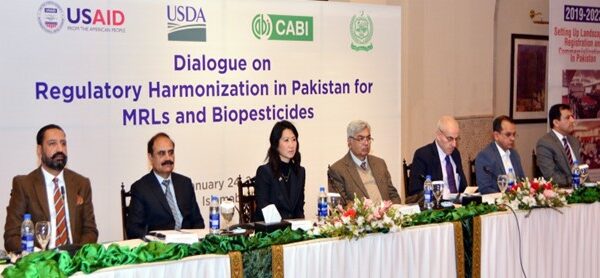
The Agricultural Minister for Sindh province in Pakistan, Mr Muhammad Ismail Rahoo, has officially endorsed a Memorandum of Understanding (MoU) which will see the establishment of Natural Enemy Field Reservoirs (NEFRs) to fight pests of fruits, vegetables and other economic crops – including cotton and rice.
The MoU was signed between the Sindh Irrigated Agriculture Productivity Enhancement Project (SIAPEP), mango farmer Syed Manzoor Hussain Shah and CABI to establish demonstration NEFRs at the farm and show how this technology can be used for the benefit of other farmers.
NEFR is a technique which provides a pesticide-free and a suitable field environment for parasitoid to flourish and combat pests in a more sustainable and biological way – without the need for harmful chemicals. Farmers who use NEFR technology praise its mode of action and viability.
Mr Muhammad Ismail Rahoo said the agreement between the Government of Sindh and the partners will “significantly contribute to sustainable agricultural development in Sindh” by tackling fruit, vegetable and other crop pests with natural enemies in a more environmentally-friendly way.
During a visit to the Syed Manzoor Hussain Shah Farm, Tando Allah Yar, Mr Ashfaque Ali, Project Manager and Entomologists Mr Babar Zaman and Mr Abdul Aziz briefed the group on natural enemies for the pests of mango. Specifically, it was shown how the NEFRs are used to rear the natural enemies, the behaviour of parasitism and auto dispersal in mango orchards for searching for their hosts – namely fruit flies (Bactrocera dorsalis) and mango hopper.

It was also discussed that interventions – such as the NEFRs – can have many benefits to farmers, allowing them to adapt biological control through Integrated Pest Management (IPM) systems and minimising the impact of pesticides on soil, water and air ecosystems. The NEFRs can also reduce the impact of pesticides on other fruits, vegetables and economic crops.

In total, 50 NEFRs are being provided to guava farmers at Lakarna (12), mango farmers at Tando Allahyar (10), cotton and okra farmers at Sanghar and Mirpurkhas (16) and sugarcane and rice farmers at Thatta-Sajjawal (12).

The signing of the MoU was witnessed by The Secretary for Agriculture, Mr Abdul Rahim Soomro, Director General Agriculture Research, Dr Noor Muhammad Baloch, Director General Agriculture Extension Sindh, Mr Hadatullah Chajro, Project Director, SIAPEP, Mr Syed Nadeem Shah, progressive growers and other stakeholders.

At the end of the ceremony, the Minister visited the functional NEFRs site and appreciated the work of all the stakeholders – especially SIAPEP and CABI and stated that such partnerships have the ability to deliver “their best for the uplift of the farming community.”
Additional information
Main image: Agricultural Minister for Sindh – Mr Muhammad Ismail Rahoo inaugurates the NEFRs at Syed Manzoor Hussain Shah Farm (Credit: CABI).
Blog author: Mr Ashfaque ali Dhaunroo – Entomologist at CABI.
Other relevant news and blogs
See also the news story ‘CABI joins forces to fight fruit fly and mango hopper pests in Pakistan’ and the blog ‘Overcoming cotton insect/pests through Natural Enemies Field Reservoir (NEFR) technology in Pakistan.’
1 Comment
Leave a Reply
Related News & Blogs
Sindh farmer gains global recognition for sustainable cotton farming innovations
Photo credit: Evronas/Better Cotton. Location: Better Cotton Conference, Istanbul, Türkiye, 2024. Sindh farmer Fateh Muhammad Laghari has gained recognition for his commitment to sustainable cotton farming practices as part of the Better Cotton Member…
5 December 2024





Happy to see this collaboration between CABI and Sindh Agriculture Department is maturing.
It was back in 2015, when I was on a World Bank mission to Sindh that I came accross this technologing being promoted by CABI. Later, when I was desigining the SIAPEP project, I included the intervention on a pilot scale and then awarded the contract to CABI on solesource, as Task Team Leader. I believed that it will bring benefits to farmers and am happy that it is being realised.